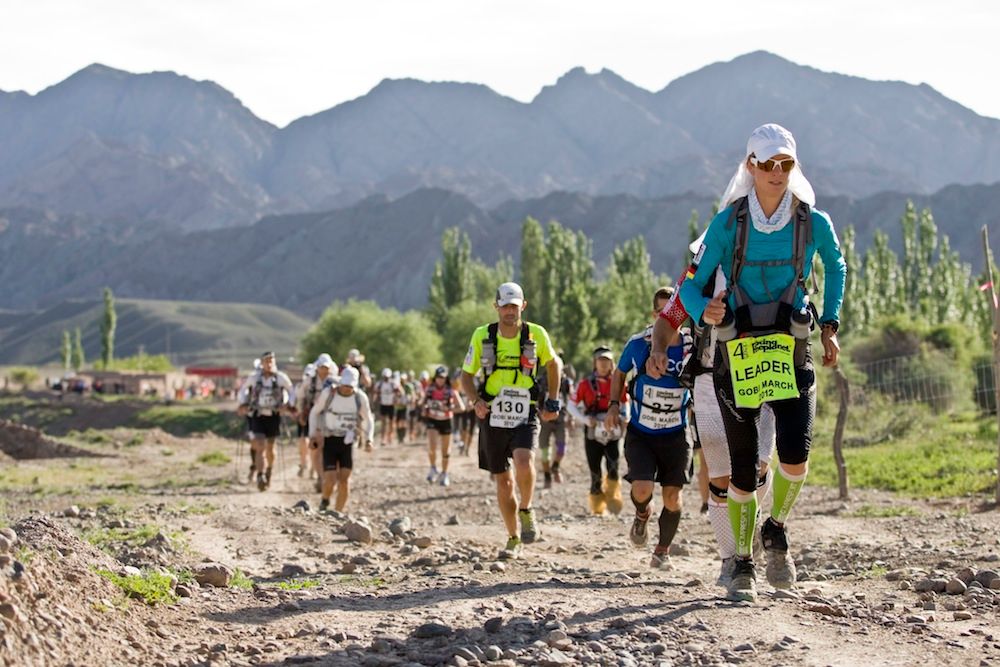A remarkable race through one of the most culturally-diverse regions of China’s far northwest gets underway on June 1st as the Gobi March takes to the highest plateaus of the Gobi Desert.
The 11th edition of the world-renowned, 250-kilometer rough country footrace will see competitors from 41 countries gathering at the starting line in Bortala region of the Western province of Xinjiang on Sunday, 1 June. With the snow-capped Altai Mountains as their backdrop, they will set out on a varied course through grasslands, over dusty and stony desert, farmlands, riverbeds, and deep into mountain alpine valleys during the six-stage course. Racing at a minimum of 1,000 meters throughout, they will climb up to 2,800 meters on the epic fifth stage and will carry all their belongings and food throughout, only given a place in a tent (or Yurt) to sleep along the way and water to nourish them.
The strongest contender for this year’s race is the double-Olympian Jose Manuel “Chema” Martinez Fernandez of Spain, who came in second place at the Sahara Race (Jordan) earlier this year in his first 4 Deserts race. The 42-year old is a highly-acclaimed athlete who finished ninth in the 10,000 meter distance of the 2004 Athens Olympics and 16th in the marathon at the 2008 Beijing Olympics and has a long list of accolades to his name, including a win at the 2008 Madrid Marathon.
Other notable competitors include Paul Borlinha of Canada who is aiming to be only the third person in the world ever to complete the 4 Deserts Grand Slam (all four races in one calendar year) in addition to the 2015 Roving Race—held in Madagascar at the end of August.
With women representing 20% of the field there are some strong performances expected. Isis Breiter from Mexico comes to her second 4 Deserts Race having finished as the 6th woman in the Sahara Race (Jordan) earlier this year. Mika Kuma, 52, from Japan was 2nd across the line in the Sahara Race 2009 where she competed as a team.
“This year’s race has attracted competitors and volunteers from a great range of countries, some that have rarely been represented before, such as Serbia, Romania, Poland, Kazakhstan, the Cayman Islands and Ethiopia” says President of the 4 Deserts Race Series, Samantha Fanshawe. “They will have the chance to race through the great kaleidoscope of cultures that makes up this intriguing Chinese region that shares its border with Kazakhstan. As they race through Mongolian settlements, along cable bridges and past a memorial to Genghis Khan—they will be able to witness up close the lives of the ethnic Mongol, Kazakh and Uyghur minorities of this storied region. “
Adding to the theme of rich cultural diversity is the benefiting charity of this year’s race, the Esquel- RacingThePlanet Scholarship Programme. The seven-year project was launched at the tenth anniversary of the Gobi March last year and is funding ten female, Uyghur students to complete their final three years of high school and two years of university. One such student is Jupaer Tuhaerbaike, an 18-year old of Kazak-ethnicity who has just finished her second year of high school with funding from the initiative. “As local traditions go, girls don’t have to go to school, their mission is to take care of the whole family,” she explains. “I cherish this chance and am studying hard to realize my dream of studying in university.”
As RacingThePlanet founder, Mary Gadams explains: “The most meaningful part of the Esquel- RacingThePlanet Scholarship Programme is the empowerment that it gives to bright and ambitious young women which could have a major positive impact on Xinjiang and China in the future. We are thrilled to be offering such a long-term commitment to these students. We look forward to meeting some of these students at the 11th edition of the Gobi March, which is one of the most culturally-diverse courses for the race."
